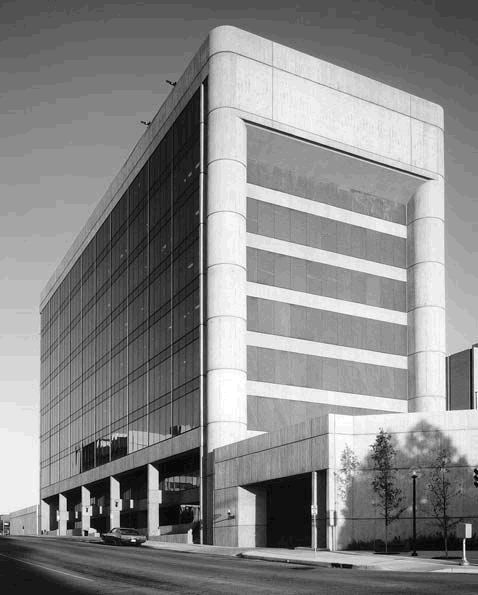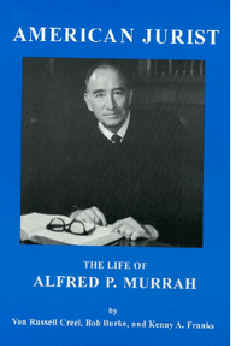| Your
Guide To Oklahoma County Oklahoma Genealogy Part of the OKGenWeb Project | |||
| Updated: 03 Sep 2025 | |||
|
| |||
|
|
Surname Index |
MURRAH BUILDING The Alfred P. Murrah Federal Building was built in 1977 between Harvey and Robinson on the East & West and NW 5th & 4th Streets on the North and South. This page does not explore
the bombing of this building in 1995. For that, see the source
for this mage, the Oklahoma
City National Memorial website.
Daily Oklahoman, The
U.S. Circuit Judge Alfred P. Murrah, 71 died Thursday at University Hospital after a long illness. Services will be at 2 pm at St. Luke's United Methodist Church with burial in Fairlawn Cemetery directed by Hahn-Cook, Street & Draper Funeral Home. Friends may call at the funeral home until 11 am Monday. Murray was known throughout the United States as Senior U.S. Circuit Judge Alfred P. Murrah. But, to his many Oklahoma friends he was known simply as "Fish" Murrah, a nick name he got in high school because of his goldfish-colored hair. Marrah had served nearly 36 years on the federal bench when, in 1950, he took senior status and accepted the position as director of the Federal Judical Center in Washington, D.C. [The Federal Judical Center is the education and research agency for the federal courts. Congress created the FJC in 1967] Born 71 years ago in Indian Territory near Tishmingo, Murrah became a federal district judge at the age of 32, serving from the northern, eastern and western districts of Oklahoma. In 1940, he was appointed to the U. S. Court of Appeals for the 10th Circuit and for 11 years was chief judge. Murrah's mother and father died when he was a youth and he migrated to Oklahoma City aboard a freight train. He was unceremoniously booted off the train in Oklahoma City by a railroad policeman. Tired of hoboing around the country, the 13 year old Murrah decided he wanted a job that would give him an opportunity to improve upon his fourth grade education. He found it on a farm in Tuttle. There he milked cows and did farm chores for his room and board. To earn spending money, he got still another job in a drugstore. Then he presented himself to the Tuttle High School principal and convinced the teacher he could take his place with other 13 year olds in the class room and still hold down two jobs. That he did and when he was graduated it was at the head of the class. With his high school diploma, he hitchhiked to Norman enrolled in the University of Oklahoma and then set out to finance his way through law school. After looking over the Norman business district, he presented himself to one merchant and announced: "My name's Murrah and I'm going to go to work for you." When the merchant snorted he didn't need any help, Murrah pointed out some things in the store that needed to be done and suggested some methods that would make the merchant more money. He got the job. Once when asked for his advice to young people, Murrah said: "Get a good education. Decide what you want to do. Whatever you like to do best is exactly the thing you are fitted for. Put your finger on a map, close your eyes and pick a place. Then go there and be diligent and decent. You won't have too much competition and you will get ahead." And, he continued don't begrudge the fact that you have to work for what you get. When he graduated with honors in 1927, Murrah hung his shingle in Seminole, then an oil boom town. He slept in his law office, prospered married an Oklahoma City school teacher and moved to Oklahoma City. When he was 32 he was the youngest man in history to be appointed a U.S. district judge. As a judge he quickly attracted attention. In remarks on and off the bench he described prisons as schools for crime, honky-tonks and night clubs as breeding places for crime and rapped "bargain table" deals between prosecutors and criminals for recommended sentences. In 1940 he was elevated to the 10th Circuit Court - a jurisdiction embracing Oklahoma, Colorado, Wyoming, Utah, Kansas and New Mexico. Federal Judicial Center Judges of the United States Courts Born October 27, 1904, in Tishomingo, OK Professional Career: Creel, Von Russell. American Jurist: The Life of Judge Alfred P. Murrah. 1996. Oklahoma City: Oklahoma Heritage Association, 1996. Parents, George Washington Murrah and Lucy Elizabeth James who married and lived in/near Earl, a now extinct community. Five children were born to George and Lucy, three of whom live to adulthood. The birth of their fifth child on July 16, 1901 was followed on August 25 by the death of Lucy, leaving George Washington with three children to rear, the youngest an infant and the oldest but seven years old. [Lucy Murrah is buried in the Earl/ Blevins Cemetery.] Murrah's first widowhood ended with his marriage to Lanora M. Simmons. Born March 8, 1874, she was some 10 years younger than her husband. For a time Murrah and his bride continued to live at Earl, and it was there on October 27, 1904, that Alfred Paul Murrah was born in Johnston County, Oklahoma. Shortly after his birth, the family moved to present-day Grady County. The Murrahs settled near the town of Verden where George Murrah found work on the Half Moon Ranch, a cattle spread started by W. G. "Caddo Bill" Williams. Attending Tennessee and Gilbert schools and playing with younger brothers, George and Elmo was the fabric of Alfred's life until February 20, 1912 when Lanora died. [The death of Lanora Murrah is reported in the Verden News, February 23, 1912, 5. She is buried in the Verden Cemetery.] The family remained in Oklahoma for a time. Willie Mae, George Washington's daughter by his first marriage, cared for the young children and home. Then about 1913-1914, George Washington returned to Alabama. Alfred Paul and George accompanied him while Elmo remained with relatives in Grady County. In Alabama, George Washington purchased a 40 acre dirt scrabble farm and married Callie Cobb Lowery, a widow with three children. One son, Cecil, was born to the marriage. Life was hard on this poor farm. There was little time for school or recreation. Death claimed George Washington Murrah in 1920. An orphan at 15, Alfred Paul found himself with few prospects but the life of a dirt farmer in rural South of the early 20th century. Murrah was not to spend his life trapped in poverty. He attended his father's funeral and then began "riding the rails." Family legend says his step-mother gave him forty dollars to leave. Murrah traveled a great part of the southern United States in boxcar accommodations. Supporting himself selling newspapers, washing dishes and selling household items door-to-door. Stopping in Alabama long enough to take George in tow, the boys boarded a freight train carrying a piece of machinery to Oklahoma. Hiding under the machinery, the trip went smoothly until the early hours when the train arrived in Oklahoma City. One of the trains crew found the boys and rudely evicted them. The boys made their way to Verden, visited their mother's grave and were reunited with their siblings and other relations. Like his father, Alfred found work at the Half Moon Ranch. Murrah read a biography of Abraham Lincoln and joined the legions of boys who have been inspired by the life of the Great Emancipator. Murrah decided to return to school. Murrah went to Tuttle to seek admission to high school. But his first task was to find a way to earn a living. He approached a family named McPhail and told them his ambitions. Taking Murrah at face value they made his aspirations their own. For milking six cows daily, Murrah received room and board, crucial to his education. The McPhails also gave him the emotional and psychological support he needed to prove himself, treating him as if he were kin. His next task was to gain admission to high school. Which he did. Murrah secured additional employment when Virginia Gannaway, owner of the Star Pharmacy who hired him as a soda jerk. Working various hours morning, noon and evening he studied between customers and after working hours and still managed to make the school debate team. One important aspect of Tuttle community life was politics. I also found on WorldConnect ANCESTORS OF ALFRED P. MURRAH [Sep 2007] Works Cited: http://politicalgraveyard.com/ Creel, Von Russell American jurist: the life of Judge Alfred P. Murrah, by Von Russell Creel, Bob Burke and Kenny A. Franks. Oklahoma Heritage Association/Western Heritage Books, c1996. Creel, Von Russell. American Jurist: The Life of Judge Alfred P. Murrah. 1996. Oklahoma City: Oklahoma Heritage Association, 1996. Daily Oklahoman, The (Online Newspaper Archives) Oklahoma City, Oklahoma, July 2007. Federal Judicial Center
http://www.fjc.gov/public/home.nsf/hisj
Sources: fair use as stated above Contributed by Marti Graham, July 2007. Information posted for educational purposes for viewers and researchers. The contributor is not related to nor researching any of the above. Please understand ALL information on this site was contributed by people like you. I am NOT able to help you with research. If it's not on the site, I don't have it. Thanks
|
|
I hope you enjoy searching through our web site, as I've spent
considerable time on it. If you find other information on the web or elsewhere that might be appropriate for this page, please let me know. I'm am particularly interested journals or other records of movement into Oklahoma County, Oklahoma. | ||
| Site authored by Marti Graham, Coordinator Oklahoma County, Oklahoma part of the OKGenWeb Project |
Visitor: Home Page last updated: Wednesday, 03-Sep-2025 02:38:22 UTC This page updated: 03 Sep 2025 |
|
|
Copyright © 1997-2015. NO PART may be reproduced without author's permission. | ||
|
You found this information at //www.okgenweb.net/~okoklaho/obit/murrah_alfred_p_judge.htm | ||

 Veteran Federal Judge Alfred P. Murrah, 71, Dies After a Long
Illness.
Veteran Federal Judge Alfred P. Murrah, 71, Dies After a Long
Illness.